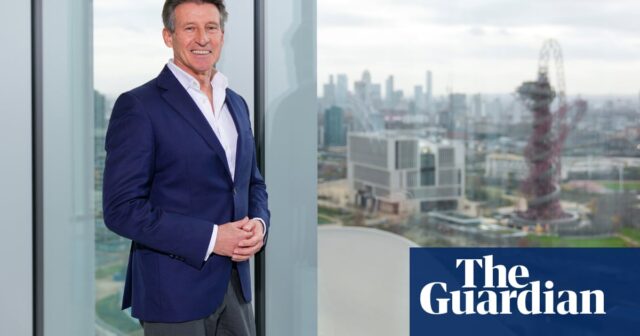Sebastian Coe has promised to radically transform the International Olympic Committee if he is elected its next president in March – and says his track record of delivering at the London 2012 Games and at World Athletics shows he is the right choice for the leading job in sport.
In launching a manifesto that positions him as a reform candidate who will ensure the IOC does far more to innovate, protect female sport, allow more debate, and get more young people into Olympic sport, Coe took himself back to the early 2000s when he was able persuade the IOC to bring the 2012 Games to London.
“I’m as excited today as I was the first time that I came here trying to sell 520 hectares of mud and breakers’ yards and rivers that had never been dredged and wildlife that had never really seen the light of day for 60 years,” he said, looking out over Queen Elizabeth Olympic Park. “I see this as another extension of the journey. It’s the dance I just couldn’t sit out.
“To have built a new city inside an old city in seven years, and to do it from a standing start and to leave 50,000 permanent, meaningful jobs and new houses, three universities … you can see from the window what is here – this is a new community, and that is the power of the movement,” he added.
However Coe warned that the IOC currently had “too much power is in the hands of too few people”, under its current president Thomas Bach.
“There’s no shortage of talent among the membership,” he said. “But the question I ask myself as a member is – what input do I and other members have? And the reality of it is, there isn’t enough.”
Coe also stressed his track record of reform at World Athletics – an organisation which he said was “in the sewer” when he became president. He pointed out that the sport had not only innovated and grown, he had also introduced governance measures such as a 50/50 gender equality split on its board.
He also promised to get more to attract more young people into sport. “And I don’t mean introducing breakdancing and thinking we’re down with the kids,” he added.
While most of the manifestos are light on policy, there does appear to be a notable shift among Coe’s main rivals, Juan Antonio Samaranch Jnr, Kirsty Coventry and Prince Feisal Al Hussein, when it comes to protecting women’s sport.
Coe has long argued in his position as World Athletics president that gender cannot trump ideology, and in his manifesto he states that he will advocate for “clear, science based policies that safeguard the female category” if elected as IOC president.
Meanwhile Samaranch, Coventry and Hussein – who were part of the IOC’s executive board that approved controversial rules for the women’s Olympic boxing tournament – all offer a commitment to protect women’s sport.
Samaranch writes that: “the IOC has a fundamental duty to safeguard women’s sport by adopting a policy to maintain unambiguous distinctions between men’s and women’s categories”, although when pressed on this by journalists he was unclear about how it would work in practice.
Meanwhile Hussein, who heads the IOC safeguarding commission, also says that there also needs to be a “scienced-based approach” when it comes to protecting women’s sport. And while Coventry is more vague, she does mention she will “strengthen women’s sports by protecting female athletes” in her manifesto.
The publication of the manifesto comes ahead of a special IOC session in Lausanne next month, where the seven candidates will give a 10-minute presentation to the IOC’s voters. The new leader will then be elected in a vote in Athens in March.






